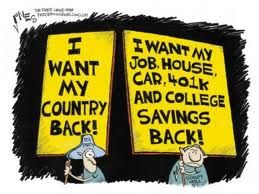Cross posted from The Stars Hollow Gazette
OccupyWallStreet
The resistance continues at Liberty Square, with free pizza 😉
“I don’t know how to fix this but I know it’s wrong.” ~ Unknown Author
 NYC General Assembly #OccupyWallStreet
NYC General Assembly #OccupyWallStreet
New York Governor, Andrew Cuomo, got told “No, we won’t do that” by Albany’s police and New York State troopers when ordered to clear Occupy Wall Street protesters from a park across the street from the state Capitol and Albany ‘s City Hall:
ALBANY — In a tense battle of wills, state troopers and Albany police held off making arrests of dozens of protesters near the Capitol over the weekend even as Albany’s mayor, under pressure from Gov. Andrew Cuomo’s administration, had urged his police chief to enforce a city curfew.
The situation intensified late Friday evening when Jennings, who has cultivated a strong relationship with Cuomo, directed his department to arrest protesters who refused to leave the city-owned portion of a large park that’s across Washington Avenue from the Capitol and City Hall.
At the Capitol, in anticipation of possibly dozens of arrests, a State Police civil disturbance unit was quietly activated, according to officials briefed on the matter but not authorized to comment publicly. But as the curfew neared, the group of protesters estimated at several hundred moved across an invisible line in the park from state land onto city property.
“We were ready to make arrests if needed, but these people complied with our orders,” a State Police official said. However, he added that State Police supported the defiant posture of Albany police leaders to hold off making arrests for the low-level offense of trespassing, in part because of concern it could incite a riot or draw thousands of protesters in a backlash that could endanger police and the public.
“We don’t have those resources, and these people were not causing trouble,” the official said. “The bottom line is the police know policing, not the governor and not the mayor.”
And to add to the ego deflation for Gov. Cuomo, Albany County District Attorney David Soares has stated:
“Our official policy with peaceful protesters is that unless there is property damage or injuries to law enforcement, we don’t prosecute people protesting,” Soares said. “If law enforcement engaged in a pre-emptive strike and started arresting people I believe it would lead to calamitous results, and the people protesting so far are peaceful.”
The camp has been named “Cuomoville”
Albany Occupy Protests Hit Millionaire Tax, Cuomo
Some protesters Monday were angry with the governor.
“Gov. Cuomo’s new name is Gov. 1 Percent because that’s who he chooses to represent – the more wealthy residents of New York state, those on Wall Street, his backers and supporters,” said Victorio Reyes, 37, a community organizer with the Social Justice Center of Albany who was making video reports from the park. “We’re not going to stand for it.”
Cuomo insists the temporary surcharge on incomes over $200,000 should expire Dec. 31, as planned when it was created under Gov. David Paterson to address a fiscal crisis. Cuomo and other opponents of the tax say it and a new proposal to tax earnings over $1 million would drive tax revenue and jobs out of state.
Throw Them Out With the Trash: Why Homelessness Is Becoming an Occupy Wall Street Issue
by Barbars Ehrenreich
As anyone knows who has ever had to set up a military encampment or build a village from the ground up, occupations pose staggering logistical problems. Large numbers of people must be fed and kept reasonably warm and dry. Trash has to be removed; medical care and rudimentary security provided — to which ends a dozen or more committees may toil night and day. But for the individual occupier, one problem often overshadows everything else, including job loss, the destruction of the middle class, and the reign of the 1%. And that is the single question: Where am I going to pee?
Some of the Occupy Wall Street encampments now spreading across the U.S. have access to Port-o-Potties (Freedom Plaza in Washington, D.C.) or, better yet, restrooms with sinks and running water (Fort Wayne, Indiana). Others require their residents to forage on their own. At Zuccotti Park, just blocks from Wall Street, this means long waits for the restroom at a nearby Burger King or somewhat shorter ones at a Starbucks a block away. At McPherson Square in D.C., a twenty-something occupier showed me the pizza parlor where she can cop a pee during the hours it’s open, as well as the alley where she crouches late at night. Anyone with restroom-related issues — arising from age, pregnancy, prostate problems, or irritable bowel syndrome — should prepare to join the revolution in diapers.
Of course, political protesters do not face the challenges of urban camping alone. Homeless people confront the same issues every day: how to scrape together meals, keep warm at night by covering themselves with cardboard or tarp, and relieve themselves without committing a crime. Public restrooms are sparse in American cities — “as if the need to go to the bathroom does not exist,” travel expert Arthur Frommer once observed. And yet to yield to bladder pressure is to risk arrest.




 Despite the anger that the American public felt towards the United Kingdom after the British Parliament established the Coercive Acts, called the
Despite the anger that the American public felt towards the United Kingdom after the British Parliament established the Coercive Acts, called the 